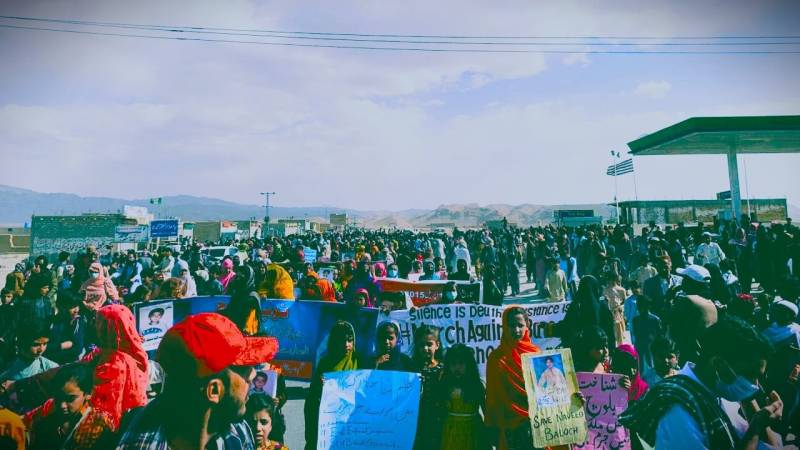
On April 10 this year, while the entire country celebrated Eidul Fitr, Balochistan was mourning. The Baloch people were on the streets protesting, demanding the safe return of their loved ones who had allegedly been abducted by law enforcement agencies. This is not the first time that on religious festivals such as Eid, the Baloch have shunned celebrations for protests against alleged state excesses; this tradition is now almost a decade old at this point.
Apart from an apathetic and painfully neglectful response from the state, the Baloch have been mocked, propagated as 'terrorists' and terror facilitators, abused in the open, and their legitimate demands rubbished as the police force is let loose on peaceful protesters.
This is the story of Balochistan in a nutshell, as far as the protesters (and the latest protests here) are concerned.
Balochistan has been termed as the 'home of enforced disappearances', especially over the last two decades. They are also labelled as 'missing persons'. An alleged 'kill and dump' policy has been reshaped as 'extrajudicial killings' and 'fake encounters'. The Baloch have resorted to protests on the ground to peacefully denounce state excesses and brutalities.
They seek to challenge concepts that those who have been forcibly disappeared have not secretly travelled 'out of the country' or are 'hiding in the mountains', as claimed by certain state actors. It must be clarified that abductions at the hands of LEAs are a fact of life in Balochistan. The foremost reasons behind these protests are the demands that the abducted individuals must be released and that any sort of policy that deliberately targets innocent Baloch must end.
However, there are others who believe that people should not resort to street protests and should instead avail themselves of legal and other available forums to resolve their concerns. I have a simple question for these 'well-wishers': what should the family of a victim specifically do when their loved ones are abducted in front of them, if not protest against this heinous act?
If we, the people and state of Pakistan, cannot give them hope, then we absolutely have no right to break their hopes either
As for the legal options, the first one is to lodge a police complaint. Police in Balochistan are always reluctant to lodge a First Information Report (FIR) in such cases, saying they fear the consequences.
The next option is approaching the judiciary. The judiciary in Balochistan has already lost its essence; in the case of Balach Mola Bakhsh, who was killed in the custody of the Counter-Terrorism Department (CTD), the culprits have yet to be held accountable.
Then, there is a recourse to approach the legislative representatives of the Baloch people. These lawmakers, sitting in a so-called assembly of the people, have already agreed to mutually beneficial terms with those implementing policies targetting the Baloch. They claim to represent the people but have secretly 'sold out' Baloch assets, people, land, and resources for a seat in the assembly which only serves them and their lust for power.
In such a situation, where every avenue of hope has been exhausted, how can a bereaved family be convinced to choose silence or try to voice their pleas on a platform which can and will yield no result except expose them to additional torment? It is not that the families are completely unaware of the whereabouts of their abducted loved ones. The real concern is the threat of aggression if they ever try to approach these locations.
Or perhaps a narrative of fear has captured the national mindset of the Baloch, who are not able to collectively resist such unfair treatment.
Over the last few years, they have found success in blocking important trade and transportation routes to raise their collective voice against those involved in abducting Baloch people right in front of their families.
From not doing anything, to getting away, to condemning wanton state aggression by demonstrating, the recent wave of protests has given a ray of hope to thousands of families in Balochistan as to what they can do legally to secure the release of their loved ones and ensure they return home. Who, then, are you and I to say that they should not protest when the only glimmer of hope they get is through protests? If we, the people and state of Pakistan, cannot give them hope, then we absolutely have no right to break their hopes either.
In short, Baloch have found the essence of raising their voice for a collective Baloch future where they can live in peace and dignity without the fear of adding to the list of 'missing persons'.

